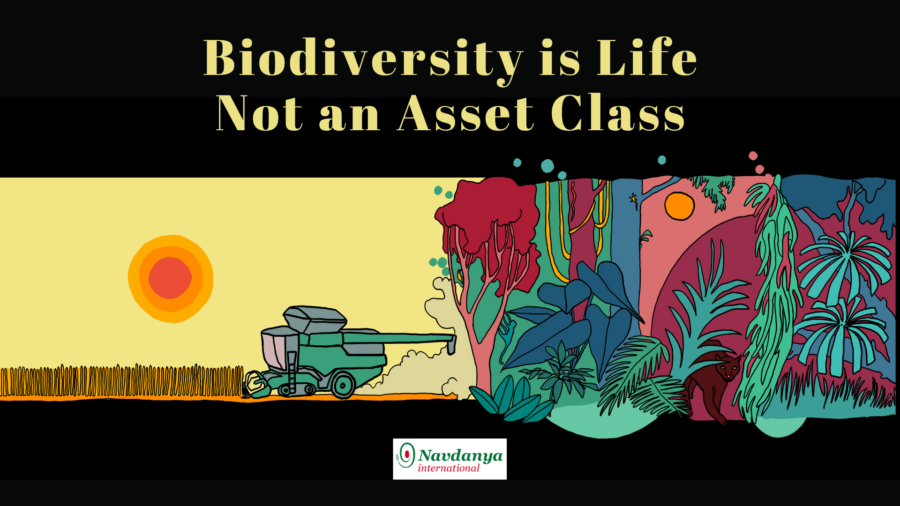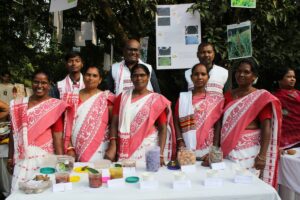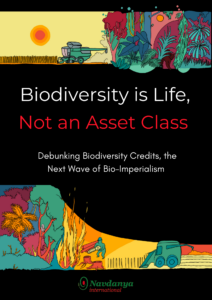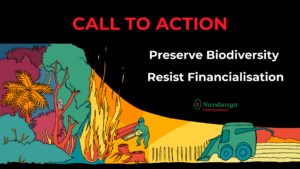
The world is facing a grave biodiversity crisis with global biodiversity having declined by 69% on average since 1970 across tens of thousands of wildlife populations worldwide. The primary culprit behind this catastrophic decline is globalized industrial agriculture, characterized by the use of agrotoxins, monocultures, land degradation, fossil fuels, and pollution. Despite international recognition of the urgent need for biodiversity restoration and conservation, biodiversity loss has continued unabated.
Instead of shifting away from the exploitative systems that have caused this mass extinction, we are witnessing a new wave of greenwashing through a series of false solutions that allow business to continue as usual. In the name of biodiversity “conservation” and “protection,” the financial sector is increasingly promoting the financialization of nature and biodiversity through market mechanisms such as biodiversity credits and Nature Asset Companies (NACs). These schemes are a new form of colonial bio-imperialism, twisting the narrative to portray an illusion of financial support for the marginalized while allowing corporations to evade biodiversity regulations and continue exploiting communities and ecosystems without accountability.
Navdanya International is committed to promoting an ecological, holistic approach to biodiversity conservation, resisting the commodification of nature, and supporting the communities that live in harmony with it. Our resources aim to provide an in-depth understanding of these issues and encourage sustainable and just practices for preserving biodiversity.
Our current biodiversity crisis is a stark reminder of the need to fundamentally rethink our relationship with nature. There is a profound interconnectedness of biodiversity and cultural diversity, and indigenous communities play a vital role local in safeguarding our planet’s ecosystems. The financialization of nature dangerously commodifies the natural world and undermines genuine conservation efforts.
It is imperative to shift away from exploitative, market-driven mechanisms that prioritize profit over ecological integrity. Instead, we must embrace holistic, ecological approaches that honor the intrinsic value of nature and the wisdom of those who have lived in harmony with it for millennia.
By understanding and supporting these perspectives, we can resist the false solutions of bio-imperialism and work towards a future where biodiversity is celebrated and protected as the foundation of life itself. This commitment to ecological sustainability, biodiversity, and social justice is at the heart of Navdanya International’s mission, and we invite you to join us in this vital endeavor.
 Celebrating Biodiversity: Vasundhara Festival 2024
Celebrating Biodiversity: Vasundhara Festival 2024
The festival took place on World Food Day (16th October 2024). It emphasized the urgent need to protect biodiversity and ecosystems from corporate-led exploitation and monoculture farming practices. Through a series of engaging events, it brought together farmers, environmentalists, scientists, and artists from India and around the world—including Italy, New Zealand, Canada, Mexico, and Australia- to spotlight the central role of local, biodiverse food systems in combating climate change and safeguarding the future of our planet. Key discussions focused on the threats posed by biocapitalism, the commodification of nature, and the imposition of harmful technologies on traditional farming. The Vasundhara Festival aimed to inspire a global movement toward regenerative, indigenous-led practices that promote ecological balance and resilience, underscoring the philosophy that biodiversity is not for sale but a shared heritage to be preserved for future generations.
Protecting biodiversity from biocapitalism, by Vandana Shiva
In recent years, the financial sector has pushed for the financialization of biodiversity through market mechanisms like biodiversity credits and Nature Asset Companies (NACs). These initiatives are presented as conservation solutions but are actually a new form of bio-imperialism. These schemes allow the financial sector, historically responsible for plundering natural resources, to determine what in nature has value and what does not. This approach risks turning the last remaining commons into mere commodities to be exploited in the global market […]
At COP 16 – Defending Biodiversity at Risk and the Path to Regeneration
The CBD was essentially created to address the erosion of biodiversity, to preserve it from corporate exploitation and to regulate potentially harmful new technologies […] Unfortunately, the concentration of power and natural resources in the hands of private multinational corporations, along with corporate-influenced global trade rules, directly threaten local and national sovereignty over natural resources […] To truly protect biodiversity, there are real solutions, rooted in care, knowledge and regenerative practices of local communities. Food sovereignty and agroecological systems offer powerful alternatives to the industrial model, demonstrating how biodiverse food cultures and economies of care can regenerate the earth and preserve its biodiversity […]
 Biodiversity is not for Sale – Illustrated Booklet
Biodiversity is not for Sale – Illustrated Booklet
This publication brings attention to the critical issues surrounding biodiversity loss and the corporate-driven models that exploit natural systems for profit.
Through powerful visuals and thoughtful narratives, this work highlights the essential role of small farmers, indigenous communities, and local custodians in preserving the Earth’s biodiversity. It delves into the consequences of industrial agriculture and the risks posed by digitalized genetic resources. It also critiques the false solutions offered by biodiversity credits and genetic modification, calling for a profound rethinking of our relationship with nature—emphasizing the need to regenerate local ecosystems through biodiverse food cultures, agroecological practices, and community-led efforts.
 Understanding Biodiversity Credits – A Factsheet
Understanding Biodiversity Credits – A Factsheet
This factsheet was created with the intention to support:
Organizations, researchers, scholars, activists, communities and individuals.
To learn, share and act on the threat that biodiversity credits pose by understanding the functioning of this financial mechanism and its emerging players.
To understand the potential risks and dangers of biodiversity credits implemented without adequate regulation, development, impartial monitoring and community participation.
A more detailed analysis on this is available in our report below.
 Biodiversity is Life – Not an Asset Class: Debunking Biodiversity Credits, the Next Wave of Bio-Imperialism
Biodiversity is Life – Not an Asset Class: Debunking Biodiversity Credits, the Next Wave of Bio-Imperialism
This report critically examines the notion of biodiversity as an asset class, arguing against the financial sector’s attempts to monetize nature.
It explains how such financial schemes, akin to those proposed for climate change finance, are often greenwashed solutions that fail to address the root causes of biodiversity loss. Instead, they perpetuate the exploitation of natural resources and marginalize the communities that protect these ecosystems.
The publication advocates for an ecological paradigm that values biodiversity for its intrinsic worth and supports the communities safeguarding it.
Also read: 50 Shades of Green: the New Markets on Nature Explained to my Grandmother – Comic Book by Frederic Hache, Green finance Observatory
 Making Peace with the Earth: Protecting Biodiversity, People’s Rights and the Integrity of the CBD
Making Peace with the Earth: Protecting Biodiversity, People’s Rights and the Integrity of the CBD
Poster – Defending biodiversity means defending the rights of the Earth, the rights of communities, and ensuring that national sovereignty is upheld. Ensuring that biodiversity governance is guided by decentralised democratic participation and respect for diverse cultural practices. It is time we start listening to women, indigenous people and the small-scale farmers protecting their plants, seeds and cooperating with Mother Nature.
 Call to Action 2024: Preserve Biodiversity, Resist Financialization
Call to Action 2024: Preserve Biodiversity, Resist Financialization
Biodiversity is the essence of life, intricately weaving together ecosystems, species, and cultures. It forms the foundation for resilience, sustenance, and the richness of our planet. However, in an era where nature is increasingly viewed as a financial asset, the responsibility of protecting biodiversity falls heavily on the shoulders of local communities and small farmers. These groups have been the custodians of biodiversity for millennia, preserving it through traditional knowledge and sustainable practices. Their deep ecological understanding fosters a harmonious relationship between human activity and nature, in stark contrast to the industrialized, extractive models that dominate global agriculture today.
Webinar – Biodiversity is Life: Rights of Nature vs Financialisation of Nature – Highlights
This webinar, moderated by Ruchi Shroff, International Director of Navdanya International, featured Dr. Vandana Shiva, President of Navdanya International; Dr. Jessica Hutchings of Papawhakarirtorito Trust, New Zealand; Frederic Hache of Green Finance Observatory, Brussels; and Silvia Francescon of the Italian Buddhist Union. The webinar highlights the intrinsic connection between biodiversity and life, emphasizing that biodiversity should not be commodified. It features insights from various experts and activists who discuss the importance of preserving biodiversity through sustainable practices and respecting indigenous knowledge. The webinar reinforces the idea that biodiversity is foundational to life itself and must be protected through holistic and ecological approaches rather than market-driven mechanisms.

Biodiversity, Financialization of Nature and Biodiversity Credits
This article delves into the alarming trend of financializing nature through mechanisms such as biodiversity credits and Nature Asset Companies (NACs). These market-based solutions are critiqued for perpetuating a colonial mindset, viewing nature merely as a resource for extraction and financial gain. The article outlines how these schemes, under the guise of conservation, allow financial institutions to decide what aspects of nature hold value, thereby ignoring and devaluing essential ecological communities and ecosystems. It emphasizes the need for an ecological approach that values nature intrinsically rather than economically.

This publication delves into the intrinsic value of biodiversity, emphasizing its role as the foundation of life. It explores how traditional ecological knowledge and practices of indigenous communities are crucial for the conservation of biodiversity.
Also read
Biodiversity is Life: Graphic Novel
June 2024
An engaging graphic novel that illustrates the importance of biodiversity and the threats posed by its commodification.
Bio-Imperialism vs. Bio-Diversity
April 2024
This publication contrasts the exploitative practices of bio-imperialism with the holistic, community-driven approaches to biodiversity conservation.
Resisting GMO Imperialism
January 2024
A critical look at the impact of genetically modified organisms on biodiversity and traditional agricultural practices.
The Attempted Destruction of Land-Based Cultures
December 2023
Analyzes the threats to land-based cultures and their knowledge systems from industrial agriculture and bio-imperialism.
Safeguarding Biodiversity for the Regeneration of the Land
July 2023
Discusses the role of biodiversity in land regeneration and sustainable agricultural practices.
Is the Kunming-Montreal Global Biodiversity Framework Enough to Protect Biodiversity?
March 2023
This article examines the effectiveness of the Kunming-Montreal framework in addressing the root causes of biodiversity loss and promoting genuine conservation efforts.
Biodiversity is Life: For Ecological and Social Regeneration
February 2023
This publication discusses how biodiversity conservation can drive both ecological and social regeneration, fostering resilient communities.
The CBD Must Resist the Commodification of All Life
December 2022
A critical analysis of the Convention on Biological Diversity’s approach, arguing against the financialization and commodification of biodiversity.
The Story of Rice
September 2021
This publication explores the cultural, ecological, and economic significance of rice, highlighting traditional practices and the threats posed by industrial agriculture.
The Story of Rice in Bali
September 2021
An in-depth look at the traditional rice farming practices in Bali, showcasing the integration of culture, spirituality, and biodiversity in sustainable agriculture.
The Biodiversity Paradigm: Building Resilience for Human and Environmental Health
November 2020
This paper, published on Springer Nature, presents a comprehensive framework for understanding the critical relationship between biodiversity and human health. It argues for resilient, biodiversity-based systems to address global health challenges.
Our Biodiversity, Our Life, Our Future
October 2017
Explores the essential role of biodiversity in sustaining life and the urgent need for its protection for future generations.
